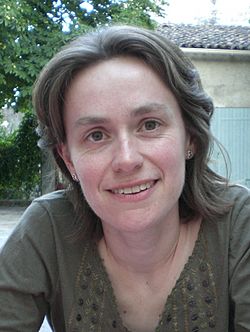Helen Wilson (mathematician) facts for kids
Quick facts for kids
Helen Wilson
|
|
|---|---|

Professor Helen Wilson
|
|
| Born | 1973 (age 52–53) Warrington, England
|
| Citizenship | United Kingdom |
| Alma mater | Clare College, Cambridge (BA, MMath, PhD) |
| Awards | President of British Society of Rheology, 2015-2017. |
| Scientific career | |
| Institutions | |
| Thesis | Shear Flow Instabilities in Viscoelastic Fluids (1998) |
| Doctoral advisor | John Rallison |
| Other academic advisors | Rob Davies |
Helen Jane Wilson, born in 1973, is a British mathematician. She made history as the first woman to lead the Mathematics Department at University College London (UCL).
Her work involves using math and computers to understand how "non-Newtonian" fluids flow. These are special liquids like toothpaste, paint, or even lava, which behave differently from water. She studies things like how plastics move or how tiny particles mix in a liquid.
Contents
Early Life and Education
Helen Wilson was born in Warrington, England. Her dad was an accountant, and her mom taught French. She went to Broomfields Junior School and Bridgewater High School.
Later, she studied at Clare College, part of the University of Cambridge. There, she earned her bachelor's degree and a special math certificate. This certificate was later changed into a master's degree in mathematics.
She then completed her PhD in math. Her PhD project was about "Shear Flow Instabilities in Viscoelastic Fluids." This means she studied how certain gooey liquids can become unstable when they flow. Her supervisor was John Rallison. After finishing her PhD, she moved to the University of Colorado at Boulder. There, she started researching how tiny particles behave in liquids with Rob Davis.
Mathematical Discoveries
In 2000, Helen Wilson came back to the UK. She became a lecturer in Applied Mathematics at the University of Leeds. Applied mathematics uses math to solve real-world problems.
In 2004, she moved to UCL. She is now a Professor of Applied Mathematics there. In September 2018, she became the Head of the Mathematics Department. This was a big moment, as she was the first woman to hold this important position at UCL.
How Gooey Liquids Flow
Helen Wilson's early research looked at how viscoelastic fluids behave. These are liquids that can act like both a liquid and a solid, like slime or dough. She predicted a new way these fluids could become unstable when flowing in a channel. Another group of scientists later proved her prediction with experiments! She still works on this topic.
She also studies how particles in a liquid affect its flow. Imagine sand mixed in water. Her newest projects combine these two areas. She looks at how solid particles interact with complex materials. This research helps in many fields, from healthcare to engineering.
You can find a list of her academic papers on the UCL website.
One of her most famous papers is called "The fluid dynamics of the chocolate fountain." She wrote it with Adam Townsend. This paper was even talked about in the Washington Post newspaper! It's not every day a math paper gets that much attention.
Sharing Math Knowledge
Helen Wilson loves to share her knowledge. In 2019, she gave a big lecture called "Toothpaste, custard and chocolate: mathematics gets messy." This talk was part of the Joint London Mathematical Society Annual Lecture series.
She also wrote about "Problem plastics & how mathematics can help." This was for UCL Science and presented at an event called Mathematics Works in 2007.
In 2016, she gave a public lecture at UCL. It was called "From gases to gloops: Instabilities in fluids." She explained how different fluids can become unstable.
Articles for Everyone
Helen Wilson has written articles for a wider audience too. She wrote a case study for the Royal Society. It was about how a supportive workplace can help a mother return to work.
She also wrote a blog post and gave an interview to BBC World TV news. This was when a female mathematician won the Fields Medal for the first time. The Fields Medal is like the Nobel Prize for mathematics.
She also wrote a simple explanation of the D'Hondt method. This method helps explain how seats are given out in elections, like the European elections.
Books She Wrote
In 2015, Helen Wilson wrote a book called "Practical Analytical Methods for PDEs." This book is part of a series on advanced mathematics.
In 2016, she worked with Dame Celia Hoyles on a chapter for a book. The book was titled "Mathematics: How It Shaped Our World."
Awards and Recognition
Helen Wilson was the president of the British Society of Rheology from 2015 to 2017. She was the first woman to hold this position! This society studies how materials flow and deform.
In 2014, she was part of a special group called ALCAB. This group advised on changes to A Level Mathematics. These changes started in September 2016.
She was also a Council Member for the Institute of Mathematics and its Applications. Now, she is the Vice-President (Learned Societies) for the Institute.

